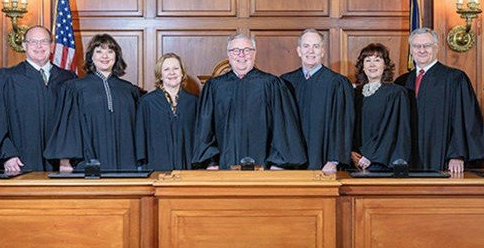By Tom Latek
Kentucky Today
The Kentucky Supreme Court on Friday heard oral arguments in a First Amendment case regarding what information a university can release about the sexual assault of two students by a professor.
The heart of the case surrounds a file compiled by the University of Kentucky against Dr. James Harwood after two doctoral candidates filed complaints about being sexually assaulted by him in the fall of 2015.
In March 2016, The Kentucky Kernel, UK’s student newspaper, requested “copies of all records detailing Dr. James D. Harwood’s resignation amid accusations of sexual assault,” including but not limited to “the Title IX complaints filed by two female students, any reprimands and commendations, Harwood’s personnel file and any documents detailing the University of Kentucky’s investigation into allegations of sexual assault, sexual harassment or allegations of alcohol abuse committed by Harwood.”

The Kentucky Supreme Court
UK responded by producing 470 pages of personnel records, subject to redactions and omissions of sensitive personal information, as well as copies of Harwood’s separation agreement and resignation letter, confirming the university had indeed investigated and addressed the survivors’ allegations.
However, the university declined to produce preliminary records, such as handwritten notes and records containing personally identifiable student information protected by the Family Educational Rights and Privacy Act, also known as FERPA.
A second request was issued the following month, to which the university responded by explaining the remaining records sought by the Kernel – namely, the survivors’ files – were preliminary records and further contained information which, if publicly disclosed, would clearly and unduly invade the survivors’ personal privacy.
As a result, the Kernel filed an appeal of the denial to the Kentucky Attorney General’s office under the Open Records Act. The attorney general held the university had to produce the survivors’ file to the Kernel, subject only to the redaction of rudimentary identifiers such as names and contact information.
The university then appealed to Fayette Circuit Court.
UK admits that at one time, the survivors reached out to the Kernel in cooperation with a story that would expose what Harwood had done but adds the Kernel did not know when to quit. By the fall of 2016, the Kernel had published at least 28 articles mentioning the survivors’ case, including 16 articles published after Sept. 14, 2016, the date the survivors expressly asked the Kernel to stop.
In fact, the survivors filed a friend-of-the-court brief, also known as an amicus brief, supporting the school and in opposition to the Kernel, saying their refusal to drop the story was forcing them to repeatedly relive the incidents that led to their complaint.
Fayette Circuit Judge Thomas Clark, who had received the documents for his review only, ruled against the Kernel. However, a three-judge panel of the Kentucky Court of Appeals reversed the ruling, prompting UK to appeal to the Supreme Court.
Kentucky’s other public universities have filed amicus briefs with the High Court in support of UK, while the Kentucky Press Association and other groups who are First Amendment advocates filed amicus briefs supporting the Kernel.
During the arguments, attorney Joshua Salisbury, representing the University of Kentucky, said there were three reasons to overturn the Court of Appeals’ decision.
“First, this case concerns statutorily protected education records belonging to two Ph.D. students working with one professor in a tiny department, and redaction will not protect those students’ privacy, because the Kernel already knows who they are.
”Second, this case concerns constitutionally protected assault records, and redaction would not suffice, because the record is interwoven with information that allows skillful Googlers to identify and expose the survivors.”
His third reason deals with the preliminary designation of a sexual assault allegation in the investigation, which is exempt from the Kentucky Open Records Act.
Attorney Thomas Miller, representing the Kentucky Kernel, responded by saying, “What UK is asking you to do is to assure no professor or teacher or coach or other employee, of any educational institution in Kentucky who abuses a student will ever again be identified publicly, ever. Because that perpetrator’s file will necessarily have a reference to the abused student.”
He noted those references can be redacted.
When asked by Justice Lisabeth Hughes if it is was the Kernel’s interest in identifying these women and putting their names out there, Miller replied, “Most of the staff of the Kernel were women at the time. Absolutely not.”
He added there was nothing to prevent someone from engaging in this type of activity at a university, resigning and signing a confidentiality agreement, and engaging in the same behavior elsewhere, if the information on the perpetrator was kept secret.
There is no timetable on when a decision will be handed down by the seven justices.



















